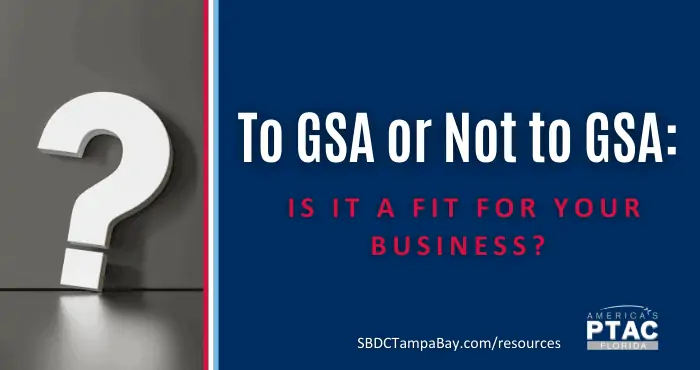To GSA or not to GSA: Is it a fit for your business?

by Karen Krymski, MPH, CVE | September 30, 2021
Author’s Note: This article is not an attempt to address the complete analysis as to whether a company needs a General Services Administration (GSA) contract/award but serves as an introduction to the question.
On a number of occasions, Procurement Technical Assistance Centers are confronted by clients who claim that they “need a GSA” to do business with the federal government. While that may be true in many circumstances, it isn’t always necessary to have that contract vehicle to gain revenue from an agency.
Whenever someone requests consulting for a GSA schedule (now called a Multiple Award Schedule or MAS), we start off by having a conversation regarding the basics of being on a schedule. Those basics include:
- In most cases, you must be in business for at least two years to apply for a GSA.
- It’s optimal if the company already has federal business as marketing and building relationships are the same as if you did not have a GSA. You can then market your GSA to those agencies where you have the relationship, if they buy from the GSA you are pursuing.
- Business owners need to research through FPDS, a historical buying portal for the federal government, to learn who buys from the GSA or research the agency’s website. If they don’t buy off the GSA you are pursuing, then it’s wasted time and money. Some agencies have other contract vehicles that they use for purchasing goods and services, such as Solution for Enterprise-Wide Procurement (SEWP V) and Chief Information Officer – Solutions and Partners 3 (CIO-SP3). Author’s Note: Only use the acronyms when talking in government circles.
- You must have invoices from customers – commercial or government – to substantiate what you want to include on your GSA and how much you want to charge for it.
- The best scenario is that you have multiple services to offer. If you can only put one to three items or labor categories on your GSA, it probably will be hard to “sell it.” Government wants to buy as much as possible from one contract, not develop a “buffet” from many if it has a large requirement.
- Companies should note that it can take up to 12 months for the MAS schedule application to be approved by the federal government and there can be updates and additional information required before the decision is made.
Every situation requires data to determine the best course to pursue. Who buys what you sell under the type of GSA you want to attain? Many clients believe that contracts will just “happen” after getting a GSA and they don’t know that there are purchase thresholds that must occur in order for the federal government to keep your GSA active.
The best method to initially determine if a MAS is right for your company is to start by reviewing the information page for prospective schedule contractors.
After you have reviewed this information and reviewed some of the training found here, you will be in a much better position to know whether your company wants to spend the resources to attain a schedule.





Karen E. Krymski
Consultants, Government Contracting Consultants, Krymski, TampaFlorida PTAC at USF, Tampa
Specialty: Procurement, Marketing
Karen Krymski has more than 20 years of experience as an entrepreneur, owning a firm that specialized in marketing, business development, public affairs, organizational leadership and strategic planning. Clients ranged from start-up small businesses to Fortune 500 companies (gold emblem brands). Her company was retained to assist in achieving clients’ strategic direction, branding and revenue goals and most retained her firm for successful execution following the planning process. Krymski’s industry knowledge spans a broad range and includes medical (behavioral health, physician practices and home healthcare) and dental; utilities (water, wastewater, solid waste and recycling); and retail promotions. She built a successful federal government business pipeline for a women-owned IT security company and also founded a local chapter of a national women’s business organization, achieving 350 invested members within a four year period. She earned a bachelor’s in health education and a master’s in public health planning from the University of Pittsburgh and completed a hospital administrative residency in Fort Myers. In 2007, she was honored as the Managing Director of the Year by eWomenNetwork, was a finalist in 2008 for the Tampa Bay Business Journal’s Businesswoman of the Year and was awarded the Iconic Woman award in 2012 from the St. Petersburg Chamber of Commerce.